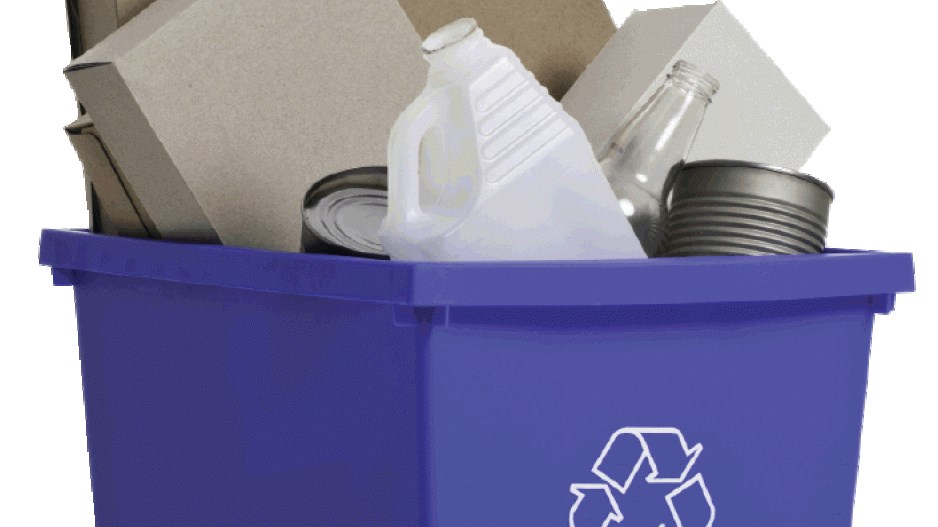For up-to-date information on municipalities' deadline for the new recycling scheme, click here.
An industry-led recycling organization has bowed to a flurry of complaints from small-business owners who said they were pressured to sign up for services with no information about the cost.
However, Multi Material BC (MMBC) still faces major pushback from B.C. mayors who complain they're also being pushed to sign up for one-sided contracts without enough information.
MMBC is an industry-run, non-profit agency that was created in 2011.
It's responsible for implementing an amendment to the province's recycling legislation that targets printed paper and packaging. Under the legislation, producers will be responsible for collecting and recycling their products, similar to the way current stewardship programs for things like tires, paint and electronics work.
This summer, small-business owners were sent letters telling them they needed to sign up for the new stewardship scheme. It was the first time many of them had heard of it.
Gerd Teetzen, the owner of Quesnel Bakery, thought the first MMBC letter was junk mail, but he took more notice of the second letter, which came a couple of months later.
"[It] had an air of urgency and threat to it, in the form that there are now penalties to be paid if I do not comply in some fashion with what the letter was asking."
The penalties threatened included a $200,000 fine and a halt to his business' operation.
The missives directed Teetzen, whose business employs 20 people, to either submit an action plan for the recyclable packaging he supplies to customers or to agree to use MMBC's services – for a fee.
But he said the fee was not made clear.
"I was basically signing a letter of intent that I was going to go with this company without knowing what is it that they were going to be asking of me."
John Winter, president and CEO of the BC Chamber of Commerce, told Business in Vancouver MMBC was in effect asking businesses "to sign a blank cheque." He met with Naomi Yamamoto, Minister of Small Business, and Mary Polak, Minister of the Environment on September 4.
On September 12, Allen Langdon, MMBC's managing director,told BIV that businesses with less than $750,000 in gross sales will not be required to submit a stewardship report. MMBC will also hold consultations with small-business owners throughout the fall.
MMBC had indeed "dropped the ball" on how they handled the issue, said Polak, with poor communication that has left many business owners unaware that change is coming. Her ministry will now monitor MMBC's efforts to develop small-business solutions.
But the organization is still proceeding with its take-it-or-leave-it offer to B.C.'s cities and towns.
Municipalities that offer curbside recycling had until September 16 to decide whether to contract their current in-house recycling services to MMBC.
If they do, they'll receive a portion of $60 million in financial incentives for signing up.
Municipalities who don't contract to MMBC have two other options: get out of the recycling business and let MMBC do it for them or continue to operate their programs without the financial incentive offered by MMBC.
The City of Vancouver discussed the issue in an in-camera meeting on September 12. As of press time, Coun. Geoff Meggs said he could not confirm whether Vancouver would sign up.
But Vancouver's position aligns with most other B.C. municipalities who "have said ... they will not accept the proposition put to them," said Meggs.
Greg Moore, mayor of Port Coquitlam and chairman of Metro Vancouver supports the concept behind the legislation, but he believes MMBC's implementation of the change has been frustratingly one-sided.
He added that the "market clearing price" – the rate MMBC has set to cover the cost of collection — appears to be unrealistically low.
MMBC did not consult with the municipalities before setting the rate.
After municipalities have signed up, MMBC plans to negotiate new contracts with recycling haulers. They could choose to deliver the recycling to a different facility than the one currently used by a municipality, which Moore said could drive up transportation costs.
Langdon said many municipalities have already signed up. Any others that have concerns can come and talk to him anytime. "The door is always open," he said.
Winter said the chamber is concerned that MMBC has consulted only with large companies, which has resulted in the design of a program skewed toward major producers. Executives from Unilever and Loblaws sit on MMBC's three-person board.




